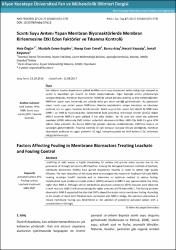Sızıntı Suyu Arıtımı Yapan Membran Biyoreaktörlerde Membran Kirlenmesine Etki Eden Faktörler ve Tıkanma Kontrolü

View/
Access
info:eu-repo/semantics/openAccessDate
2017Author
Özgün, HaleErşahin, Mustafa Evren
Dereli, Recep Kaan
Atay, Burcu
Kayaalp, Necati
Koyuncu, İsmail
Metadata
Show full item recordAbstract
Katı atıkların arazide depolanması yüksek kirlilikte sızıntı suyu oluşumuna neden olduğu için yüzeysel ve
yeraltı su kaynakları için önemli bir tehdit oluşturmaktadır. Diğer biyolojik arıtma yöntemleriyle
karşılaştırıldığında, membran biyoreaktörler (MBR) ile yüksek kalitede arıtılmış su elde edilebildiğinden,
MBR’lerin sızıntı suyu arıtımında son yıllarda daha çok tercih edildiği görülmektedir. Bu çalışmanın
amacı sızıntı suyu arıtımı yapan MBR’lerde tıkanma nedenlerinin ortaya konulması ve tıkanmayı
azaltmak için en uygun metodun belirlenmesidir. Sızıntı suyu arıtımı yapan tam ölçekli iki MBR tesisi
(MBR-1 ve MBR-2) kıyaslandığında; karbonhidrat bazlı çözünmüş mikrobiyal ürünler (ÇMÜk
) değeri
MBR-2 tesisinde MBR-1’e göre yaklaşık 5 kat daha fazladır. Her iki tesis için hücre dışı polimerik
maddeler (HPM) miktarında ÇMÜ miktarı kadar fark olmamakla birlikte, MBR-2’de MBR-1’e göre HPM
miktarı daha yüksektir. Bu durum MBR-2’de görülen tıkanma problemlerinde, ÇMÜ’nün başlıca rol
oynadığını göstermektedir. Tıkanma kontrolü ile ilgili deneysel sonuçlar dikkate alındığında, membran
tıkanmasını azaltacak en uygun yöntemin 50 mg/L konsantrasyonda toz aktif karbon (TAK) eklenmesi
olduğu belirlenmiştir. Landfilling of solid wastes is highly threatening for surface and ground water sources due to the
generation of strongly polluted landfill leachate. Among the biological treatment methods of leachate,
membrane bioreactors (MBRs) have gained importance recently in order to obtain high quality
effluents. The main objectives of this study were to investigate the reasons for fouling in full scale MBRs
treating municipal landfill leachate and to determine an optimum method to reduce fouling.
Carbohydrate type soluble microbial product (SMPc) amounts in MBR-2 was approximately five times
higher than MBR-1. Although similar extracellular polymeric substances (EPS) amounts were observed
in both reactors, MBR-2 still contained slightly higher amounts of EPS than MBR-1. The fouling problem
observed in MBR-2 supported the idea that SMPs played the major role in membrane fouling. According
to the results of short term filtration tests conducted with MBR-2 sludge, the optimum alternative to
reduce membrane fouling was determined as the addition of powdered activated carbon with a
concentration of 50 mg/L.
Source
Fen ve Mühendislik Bilimleri DergisiVolume
17Issue
2URI
http://fenbildergi.aku.edu.tr/wp-content/uploads/2017/10/025402-571-579.pdfhttp://hdl.handle.net/11630/4648
Collections
- Cilt 17 : Sayı 2 [53]


















